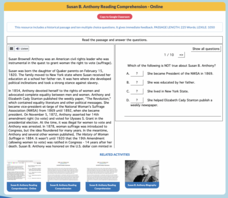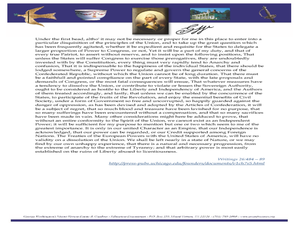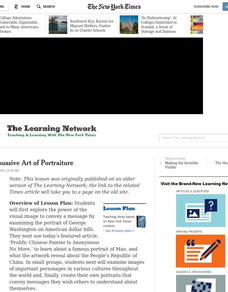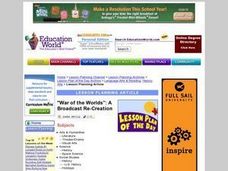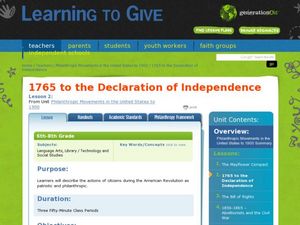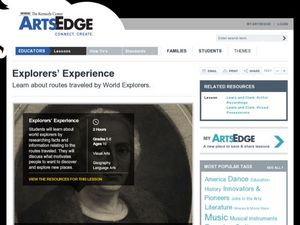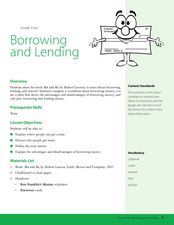Mr. Nussbaum
Susan B. Anthony
An interactive reading practice focuses on Susan B. Anthony. Scholars read an informational text, then answer 10 questions.
Dick Blick Art Materials
Stitch It Up!
Ever think about combining the art forms of painting and embroidery? Then this art lesson is right up your alley! Given a piece of white cloth, young artists first create a grayscale painting and then highlight certain features by...
Curated OER
Missing Masterpieces
Learners investigate a fictitious crime involving stolen art masterpieces. They work collaboratively in teams to solve the fictitious crime. Students return the stolen paintings in a Microsoft PowerPoint "portfolio" to their owner. They...
Curated OER
Gender Roles
Students discuss gender roles and through case study, examine how gender roles can be learned and how they can be limiting. They research to find the names of both men and women who have become successful in various careers.
Curated OER
The Olympics Return Home
Students compare the ancient Olympic Games with the modern version of the event. They study the history of the Games and observe how they have changed through time.
Curated OER
Pioneer America: Legendary Westerners - Can One Person Really Make a Difference?
Fourth graders research famous Americans from the Westward Movement and complete an interview. For this Westward Movement lesson, 4th graders work in pairs to research someone who was important during this time period. They prepare and...
Curated OER
Reconstruction to Civil Rights
Eighth graders complete a unit of lessons on the period of time from Reconstruction to the Civil Rights movement. They analyze and interpret political cartoons and editorials, conduct research on famous civil rights places, and complete...
Curated OER
4th Grade Reading: Information
In this reading worksheet, 4th graders answer multiple choice questions about 1/2 page informational text that they read. Students complete 21 questions.
Curated OER
Historical Figure: A Monologue
Fourth graders develop their speaking skills. In this monologue lesson, 4th graders watch their instructors model a monologue regarding Abraham Lincoln. Students apply these skills as they research a historical figure from their state...
Curated OER
George Washington & the Classics
Students will compare and contrast famous philosophers with George Washington. For this history lesson, students work in small groups to define Classicism, Legalism, Democracy, Republic and Civility, then read some short excerpts so...
Curated OER
The Making of the Declaration of Independence
Students can delve into how Thomas Jefferson's words in the Declaration of Independence changed history.
Curated OER
Egypt's Greatest Leaders
Students study about seven of Egypt's most famous pharaohs. They discuss leadership styles and draw conclusions about the success of each of these pharaohs. They, in groups, create a project about a pharaoh they studied.
Curated OER
The Persuasive Art of Portraiture
Students first explore the power of the visual image to convey a message by examining the portrait of George Washington on American dollar bills. They next use, 'Prolific Chinese Painter Is Anonymous No More,' to explore a famous...
Curated OER
"War of the Worlds": A Broadcast Re-Creation
Why did Orson Welles' 1938 Broadcast of a adaptation of H.G. Wells' The War of the Worlds cause such a panic? To answer this question, class members listen to the original broadcast and research the panic that resulted. They then engage...
Curated OER
1765 to the Declaration of Independence
Students research philanthropists of the American Revolution. In this philanthropy activity, students watch the video Johnny Tremain and analyze the characters and determine their motives. Students read the Declaration of Independence...
Curated OER
Martin Luther King Jr.
Second graders discover contributions made to society by Martin Luther King Jr. In this civil rights history lesson, 2nd graders are read two books about Martin Luther King Jr., answer questions about the books, and complete a timeline...
Curated OER
Contributions that Martin Luther King Jr. Made to Society
Second graders discover the positive effects Martin Luther King, Jr. had on society. In this U.S. history instructional activity, 2nd graders investigate racial tensions from sixty to seventy years ago and view a video about MLK, Jr....
Curated OER
Write Your Own "I Have a Dream" Speech
Students listen to King's famous "I Have a Dream" speech. They use a fill-in-the-blanks worksheet to express their dreams for the world in a format similar to King's speech.
Curated OER
National Handwriting Day
In this National Handwriting Day worksheet, students complete activities such as reading a passage, phrase matching, fill in the blanks, choose the correct word, multiple choice, spelling, sequencing, scrambled sentences, asking...
Curated OER
Learning to Respect Each Other
Discover how important Martin Luther King Jr. is to our society. In this civil rights lesson plan, investigate how Dr. King was an advocate for nonviolence and how he fought for civil rights for all Americans. Read and analyze Dr. King's...
Curated OER
Explorers’ Experience
Students investigate the Exploration Age. In this research skills lesson, students discover the impact of exploration as they locate information about selected explorers. Students design and create relief maps that feature exploration...
Curated OER
Borrowing and Lending
Fourth graders investigate the advantages and disadvantages of borrowing money. In this financial awareness activity, 4th graders read the book Ben and Me and create a table displaying the advantages and disadvantages of borrowing money.
Curated OER
Teaching Lewis and Clark: Tribal Cultures and Homelands
Learners examine the attributes of the tribes that inhabited the Columbia River Basin. In this Lewis and Clark lesson, students participate in a classroom simulation that requires them to participate in a seasonal round, in which they...
Curated OER
Opinionnaire Worksheet -- Folk and Family Heroes
In this opinion worksheet, students think about heroes they know and reveal what they think about them by marking responses to the questions and completing the statements.


